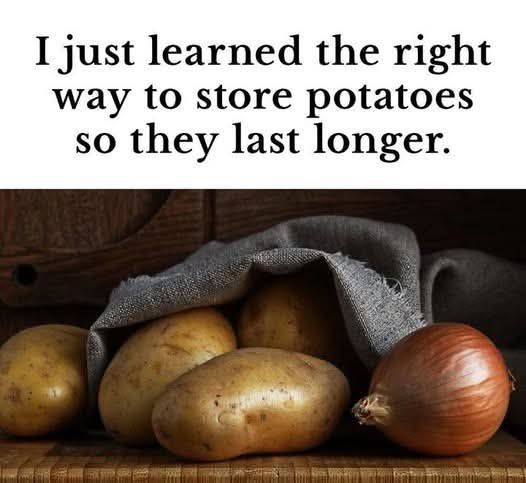ADVERTISEMENT
How to Store Potatoes and Onions the Right Way
Potatoes and onions are staples in kitchens around the world. Their versatility, long shelf life, and ability to complement a wide range of dishes make them kitchen essentials. However, if not stored properly, both potatoes and onions can spoil quickly, sprout, or lose their flavor. Knowing the best way to store these kitchen essentials will not only extend their shelf life but also maintain their freshness and quality. In this article, we’ll guide you through the best methods for storing potatoes and onions, ensuring they stay delicious and usable for as long as possible.
How to Store Potatoes the Right Way
Potatoes are a versatile ingredient, used in everything from mashed potatoes to fries, soups, and stews. But to get the most out of your potatoes, proper storage is key.
1. Choose the Right Location:
Potatoes should be stored in a cool, dark, and well-ventilated place. A pantry, cellar, or cupboard away from direct sunlight is ideal. The temperature should be between 45°F (7°C) and 50°F (10°C). Storing potatoes in a warm environment can encourage sprouting and spoilage.
Tip: Avoid storing potatoes in the refrigerator. While it might seem like a good idea to extend their shelf life, the cold temperature of the fridge can turn the starches in potatoes into sugars, which will affect their taste and texture.
2. Use a Ventilated Container:
Potatoes need to breathe to prevent moisture buildup, which can lead to mold and rot. Store them in a perforated paper bag, basket, or cardboard box with good ventilation. If you’re using a plastic bag, make sure it has holes to allow airflow.
Tip: Don’t store potatoes in sealed plastic bags or containers, as they trap moisture and can cause the potatoes to deteriorate more quickly.
3. Keep Potatoes Away from Onions:
While both potatoes and onions should be stored in cool, dark places, they should never be kept together. Potatoes release moisture and gases, which can cause onions to sprout or spoil. Onions, in turn, can emit sulfur compounds that affect the flavor and texture of potatoes. Store them separately to avoid these issues.
4. Check Potatoes Regularly:
It’s important to check your potatoes every few days for any signs of sprouting, soft spots, or rot. Remove any potatoes that are damaged or sprouting to prevent them from affecting the others. If you find any sprouting, the sprouts can be removed, but it’s best to use the potato soon after to ensure its quality.
5. Avoid Storing Potatoes Near Apples or Bananas:
Apples and bananas emit ethylene gas, which can speed up the ripening process of potatoes and cause them to spoil faster. Keep potatoes away from these fruits to ensure they last as long as possible.
How to Store Onions the Right Way
Onions, like potatoes, are a kitchen staple and can be stored for weeks, if not months, when handled properly. However, onions are a bit more delicate and require a specific storage method to preserve their flavor and texture.
1. Store Onions in a Cool, Dry, and Well-Ventilated Place:
Onions should also be stored in a cool, dry place, away from sunlight. A pantry, cellar, or even a kitchen countertop (if it’s cool enough) is ideal. The temperature should be between 40°F (4°C) and 50°F (10°C). The key here is to avoid excessive moisture, as this can lead to mold growth and spoilage.
Tip: Avoid storing onions in the fridge, as the cold and humidity can make them soft and lead to faster deterioration. However, once an onion is cut, it should be refrigerated in a sealed container or wrapped tightly to prevent it from drying out.
2. Use a Mesh Bag or Basket:
Onions need to be stored in a well-ventilated environment to prevent moisture buildup. A mesh bag, wire basket, or a perforated container is ideal for this purpose. These options allow air to circulate around the onions, helping to keep them dry and fresh.
Tip: Don’t store onions in plastic bags, as they can trap
